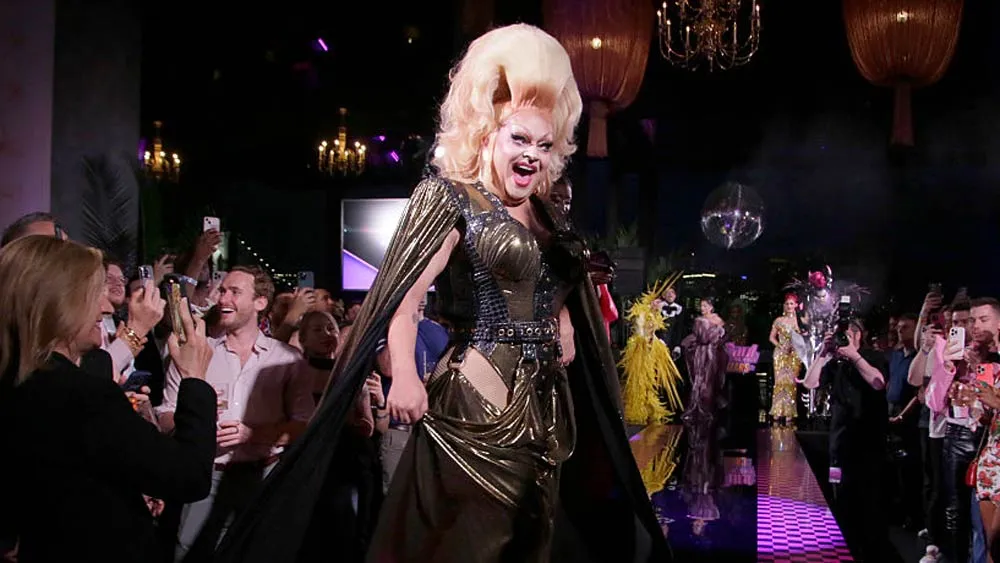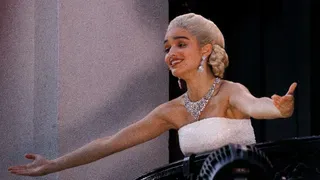April 21, 2011
Stonewall Uprising :: Filmmakers make 'gay history American history'
M. M. Adjarian READ TIME: 7 MIN.
The Stonewall Riots are 'the Rosa Parks moment' for gay rights. Stonewall Uprising, a recent doc film (to be aired on PBS & released on DVD) about the event, re-examines the event. EDGE spoke to directors Kate Davis & David Heilbroner about their film.
On Monday, April 25, PBS will air Stonewall Uprising. Jointly directed by acclaimed documentarians Kate Davis and David Heilbroner, the film offers a fascinating-though perhaps somewhat simplified-look at what Time Magazine has said is "the 'Rosa Parks moment' of the gay rights movement."
The DVD of Stonewall Uprising will also be available on April 26th on shoppbs.org.
This latest addition to the distinguished Davis/Heilbroner oeuvre is divided into a section that sets Stonewall in its historical context, another that deals with the event itself, and one that briefly examines the aftermath. To tell the story, the filmmakers use excerpts from anti-gay socialization films, made-for-TV news segments, reenactments, collected still images, and interviews from journalists, politicians and event participants on both sides of the law.
The directors excel at showing the fiercely homophobic environment that characterized 1960s America. Their depiction of a time when the likes of Mike Wallace narrated a "CBS Reports" segment that stereotyped homosexuals as "promiscuous" and "not interested in or capable of forming lasting relationships like heterosexual marriage"; or when homosexuality itself was viewed as a type of "psychopathy" that was often "treated" by chemical castration or electroshock therapy is as terrifying as it is profoundly disturbing.
Davis and Heilbroner's evocation of late 1960s New York is also compelling. Young queers flocked to the city-which had become a mecca for the new counterculture-from all over the country to search for others like themselves. They congregated where they could, even it meant being openly exploited at Mafia-run bars like the Stonewall Inn. At places like these, they could at least find temporary respite from a world where they were routinely stalked, harassed and beaten by civilians and police officers alike.
The directors' handling of the actual event is deft. Still images and reenactments of the chaos that was Stonewall mingle with vivid recollections actual participants offer of the event. One, a former NYPD officer from the "public morals" division, gives testimony that shows just how deeply the event-and the struggle for civil rights that followed-impacted heterosexual consciousness. "You know they broke the law," he says, "but what kind of law was that?"
As a Stonewall primer, the film is a success. But as a documentary that probes the complexities of the event, it is admittedly wanting. For example, the film focuses on a homogeneous-which is to say, white-group of interviewees, effectively ignoring how such variables as race and class impacted the event. It also glosses over the contributions such LGBT organizations as the Mattachine Society and the Daughters of Bilitis made to the development of gay identity and political activism. Still, for gay and straight viewers interested in an introduction to Stonewall and its place in American history, the film works well.
Davis and Heilbroner themselves are no strangers to social justice issues, particularly as they pertain to the LGBT community. The two produced Anti-Gay Hate Crimes (1998) and Transgender Revolution (1999) for A&E. And Davis both produced and directed Southern Comfort (2001), an Emmy-nominated, multi award-winning film about a female-to-male transsexual who is diagnosed with ovarian cancer. Recently, I interviewed this dedicated and socially aware pair of documentarians about their latest effort.
Story continues on following page:
Watch this interview with the filmmakers behind Stonewall Uprising shot at the Stonewall Inn:
Watch the trailer to Stonewall Uprising:
Filmmakers’ inspiration?
EDGE: What inspired you to make Stonewall Uprising?
Kate Davis & David Heilbroner: We have long been involved with raising consciousness about LGBT rights. And we are drawn to human dramas to bring to life political themes. So the inspiration, if you will, was already in place. We just needed the right funder and venue.
EDGE: Why was Stonewall selected as a topic for the American Experience series?
Davis & Heilbroner: WGBH did research and found that the Stonewall events were much more dramatic and complex than the legend leads us to believe. They believed that the story should become integrated in our sense of history. The time, to their editorial decision-makers, must have seemed appropriate. We were indeed flattered to have been approached for this project.
EDGE: What relationship does this documentary have to the other films you have directed in the last 15 years-where do you see it fitting into your joint oeuvre?
Davis & Heilbroner: Apart from LGBT issues, which we have addressed in three previous films (Southern Comfort, Transgender Revolution and Anti-Gay Hate Crimes) we have tried to make films that help viewers consider issues with a new perspective. Often, this leads to working with maligned, marginalized or misunderstood groups. The beauty here is that gay men and women made great strides after Stonewall. So, for once, we made a documentary with a happy (well, less-than-tragic) ending, though of course the battle is not over.
Memories and snapshots
EDGE: What audiences do you hope to reach (aside from those based in the LGBT community) with Stonewall Uprising ?
Davis & Heilbroner: Our dream from the start was, as Kate puts it, "to make gay history American history." Stonewall, we hope, will join the Rosa Parks protest and Selma lunch counter [sit-in] as an essential part of the great procession of human rights in the US.
EDGE: What challenges did you encounter in the making of this film?
Davis & Heilbroner: Our challenges were visual, visual, and visual. There are seven still images of the Stonewall riots. Period. How do you fill a film with memories and handful of snapshots? We finally turned to archival images mixed with still reenactments, but that's just part of the huge creative mountain we had to climb to give this vibrant moment a fitting treatment.
EDGE: And the rewards?
Davis & Heilbroner: We've been fortunate to have been fully funded from the outset. Theaters have booked us across the US. Reviewers have paid attention, mostly with highly favorable words. And the American Experience broadcast is forthcoming (April 25th). Also, discovering that many people who participated in the riots are still alive and well was gratifying, and we believe the film will be a lasting record of their lives. (Since the shooting, two major subjects in the film have died, another having become terribly ill.)
EDGE: Did the making of this film reveal anything to you about the riots and/or the state of the pre-Stonewall LGBT community that you found especially important or compelling?
Davis & Heilbroner: We uncovered a treasure trove of archival footage which brings to life the extent of entrenched homophobia in 50s and 60s America. It is one thing to have a vague stereotypical sense of more oppressed times, another to watch public service announcements, television newscasts, and films which promotes ideas that now seem barbaric. It is essential to understand how dark the not-so-distant past is, regarding the appalling treatment of the gay community, so we can understand our roots as a culture and how far we have come.
EDGE: You interview a law enforcement officer who had been part of the Stonewall police raid. What seemed to be his attitude toward events, 40 years after the fact?
Davis & Heilbroner: One of the central ironies which surfaces in the film is the fact that the NYPD officer who led the charge in June 1969, when interviewed by us some 40 years later, felt regretful. For us, he represented the better part of the status quo, which shifted with evolving societal beliefs.
EDGE: Were you able to locate any of that officer's colleagues and if you did, how did they feel about being interviewed for the film?
Davis & Heilbroner: No other officers were findable, even after David Carter (who wrote the book on which our film was based) did 10 years of research and interviews.
EDGE: Why did you decide to call your documentary Stonewall Uprising rather than, for example, The Stonewall Riots?
Davis & Heilbroner: The word "uprising," as Village Voice reporter Howard Smith explains in the film, implies that people are reacting with a focused sense of righteous indignation. There was, in fact, a collective political force behind the nights of rioting; they were not merely wild skirmishes with no deep emotional underpinnings.
EDGE: What particular lessons do you believe Stonewall has taught American society (about itself)?
Davis & Heilbroner: We hope Stonewall teaches that sometimes it takes a revolutionary spirit to change things, and that the risk involved is well worth the gamble. That even in very oppressive times, it is possible for forces to come together and galvanize oppressed voices. That the least powerful people can suddenly play the most important role. That change is possible, even if we cannot fight our battles alone.
Stonewall Uprising will air Monday, April 25, between 9PM and 10:30PM on your local PBS Station. The film will be released on DVD on April 26 and is available at Watch this review of Stonewall Uprising by former New York City mayor Ed Koch:
Watch this post-screening interview with the filmmakers behind Stonewall Uprising:
M. M. Adjarian is a Dallas-based freelance writer. She contributes to EDGE, the Dallas Voice, SheWired and Arts + Culture DFW and is a book reviewer for Kirkus.



